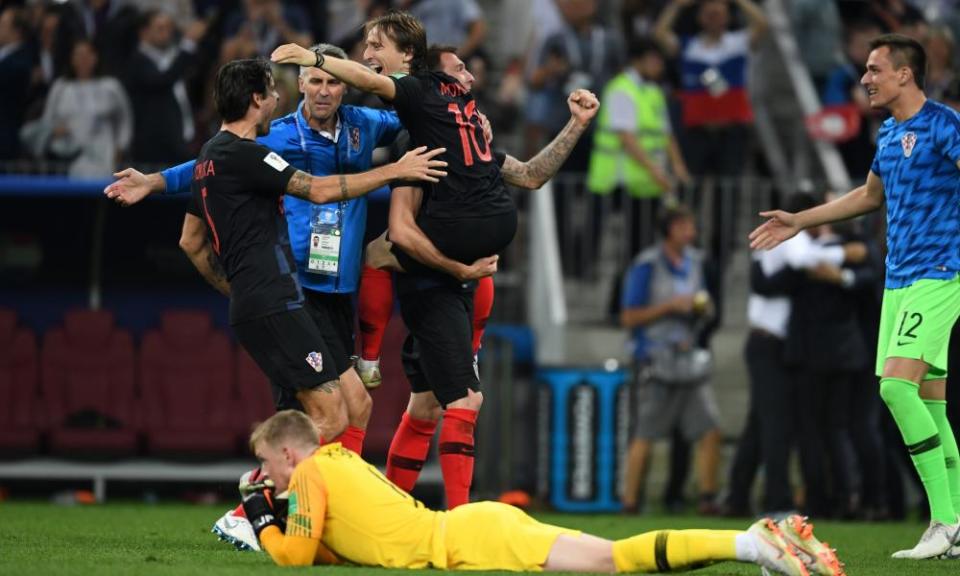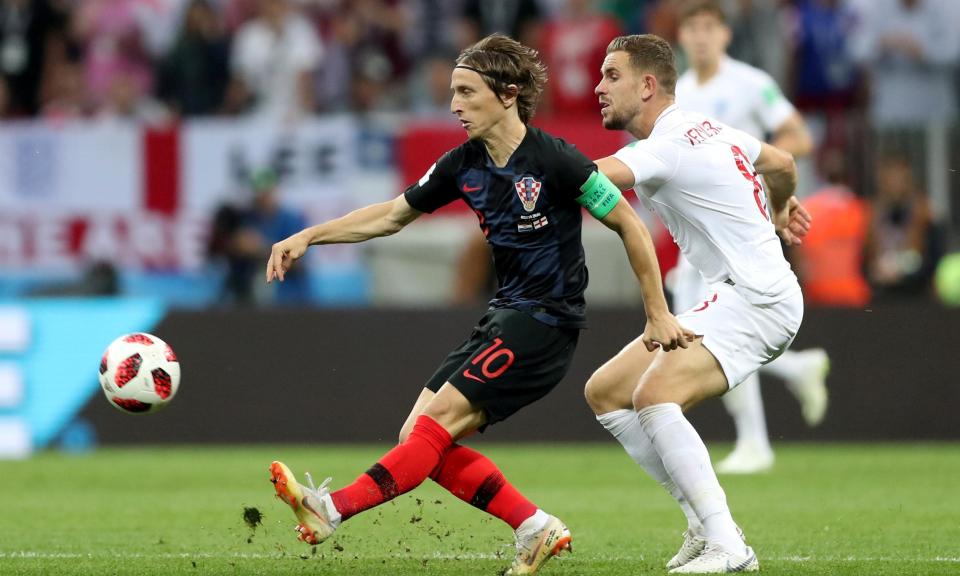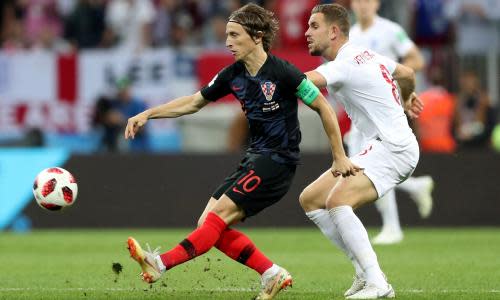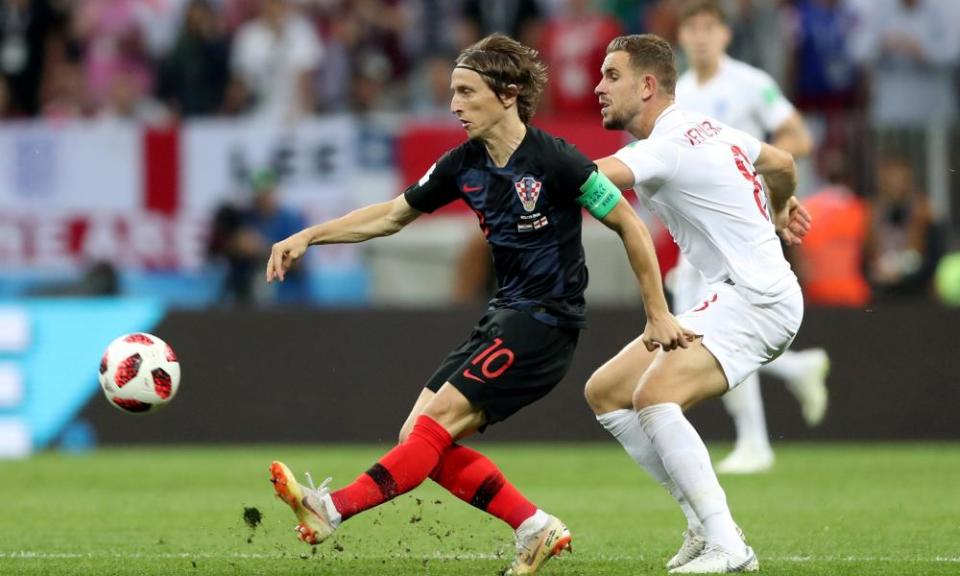Luka Modric, rhythmical and resolute, should be named world’s greatest
Welcome to the Modric supremacy. Yes, it has been a while. But we’re here now. For Luka Modric the ascent to the summit has been 15 years in the making, from having his ankles hacked raw at Zrinjski Mostar to running more metres aged 32 than any other player at Russia 2018, in the process driving Croatia to the verge of the first genuine small-nation underdog victory in World Cup history.
Sport does not normally work like this. Athletes do not improve every year for more than a decade. Small, pigeon-toed men who don’t score goals, and whose elfin on-field presence is reminiscent even now of a small boy dressed up as a witch, do not make the step up to galáctico at the world’s most glamorous club.
Except for this one. Right now the only real issue with just doubling up at the Luzhniki Stadium and handing the Ballon d’Or over to the world’s most elusive midfielder is that fact, should things go the other way come December, you might not get it back. Sorry. Yes. Behind you. Gone again. Nope. Floating over there 40 yards away, right on to Ivan Perisic’s big toe.
READ MORE: Everton win farcical pre-season friendly 22-0
READ MORE: Chelsea star Hazard drops huge hint over future
READ MORE: Who can beat Harry Kane to the World Cup Golden Boot?
As Russia 2018 reaches its vanishing point in Moscow on Sunday afternoon it seems a good moment to remember that it was billed, quietly but persistently, as a possible changing of the guard in the Fifa star system. It has after all been 11 years now, 11 years of watching the conjoined Messi-Ronaldo godhead duke it out every December for the right to stand in a velveteen gingham tuxedo holding up that prized golden ball.
Neymar was the pre-tournament favourite to make that step up in Russia, having spent the past few years being winched into place as the next golden god in waiting. Instead, his World Cup unspooled into a kind of extreme physical comedy. In his absence from the late stages – and we wish Neymar well in his long convalescence – Fifa will have been eyeing the progress of Kylian Mbappé, eager to borrow a little magic dust from the rising star of the world game.
Mbappé has been wonderful, and may yet gambol off with the final. But win or lose there is a fair chance a less saleable figure might get his turn come December.
Modric for the Ballon d’Or: it is a delicious prospect at a time when star players are fetishised to a bizarrely sensual degree, styled and primped and captured in constant brooding close-up.
Croatia’s captain will not be the oldest outfield player as the final kicks off. He does not feature in the list of the top 25 highest-paid players in the world. Kit aside, he does not appear to have any headline personal sponsors. He is, instead, the ultimate high-grade component, the player who drives the player who drives the player who scores the goal, the part that makes every other part function with more vim and more precision.
To wonderful effect in the last three years. A World Cup final follows the Champions League “three-peat” with Real Madrid. A winner’s medal would complete a run of personal success equalled only by the Bayern Munich-West Germany cross-over of the 1970s – Franz Beckenbauer, Gerd Müller, Sepp Maier and friends.

Of course, none of these were playing for Croatia, the second-smallest nation ever to compete in a World Cup final.Modric’s influence on this feat has been profound. He tops the metrics: more steps run, more passes made than anyone at the World Cup who isn’t a Spaniard. Most minutes played by a Croatian, most touches, most dribbles completed. Not that any of this has ever been his measure.
Watching Modric on a good day is like being drawn into a slow-building piece of music, not something with a snappy intro or a thunder of percussion at the start; but something absorbing and rhythmical and clipped, where suddenly the parts start to chime together, the phrases to expand and repeat and find deeper melodies until you can’t imagine wanting to listen to anything else.
Modric dragged the semi-final away from England in stages, never hurried, just steadily asserting his craft. It is an ability to read the tides and find a weak spot that England first saw back in 2007 when the 22-year-old Modric quietly traumatised Wayne Bridge at Wembley, playing a series of horrible, malevolent little passes inside England’s left-back, at one point forcing Bridge to punt the ball back on to his own bar.
Still, though, a Modric Ballon d’Or would be a break with recent tradition, an anti-glamour move. The last unshowy Ballon d’Or was Fabio Cannavaro in 2006, since when Xavi and Andrés Iniesta have had a podium finish. Otherwise, it’s goalscorers all the way. And this is a midfielder who has scored only nine league goals for Real Madrid in six years.
READ MORE: Lloris vows for no repeat of Euro 2016 final
READ MORE: Deschamps laughs off claims that Modric is ‘immobile’
READ MORE: Karius booed during Liverpool’s pre-season friendly
But then, Modric has always had to listen to what’s wrong with him before he gets the chance to show what’s right. Anyone surprised by his anger at the triumphalism of certain English pundits probably hasn’t been watching. This is what gets him going. The story of that tough early life has been told many times, from the wartime murder of his grandfather by Serbs near the family home, to a refugee existence at the Iz Hotel in Zadar, to the poverty that saw his father make young Luka wooden shin-pads so he could play matches (a story Modric has since raised an eyebrow at). Even now Modric has become a divisive figure in his moment of triumph. “Luka Modric, you little piece of shit,” was a familiar chant among Croatia fans during the last year, a reference to Modric’s role in the corruption trial of Zdravko Mamic.
Mainly Modric has had to fight those reservations about his small frame in an evermore concussive game. Aged 21, he was rejected by Arsène Wenger (of course) and also Barcelona, where the sliding doors universe partnership with Iniesta and Xavi that never was is one of football’s many lost Edens.
It was 10 years ago at Euro 2008 that Modric proved decisively to the world he had the craft and the tenacity to overcome any barrier. In Klagenfurt he was battered and kicked and bumped by Torsten Frings, Michael Ballack and Bastian Schweinsteiger, but bounced up to elude and bewitch and generally run rings around Germany’s midfield. It is perhaps the best model of what Modric might face at the Luzhniki Stadium on Sunday.
France will be prepared. They have a huge depth of talent but also a real physicality. Modric will once again be hunted down, snapped at. Interrupting his flow will be key to a France victory. It is a challenge he has never shirked. And win or lose, he deserves every late-breaking accolade.





